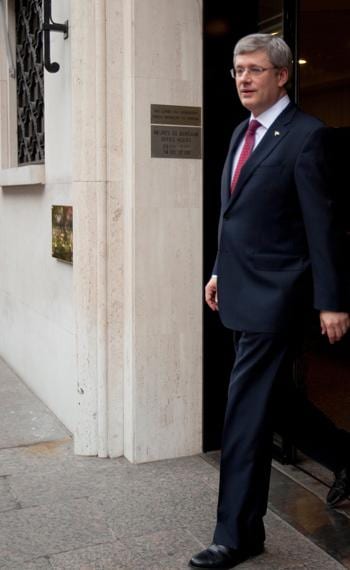Stephen Harper’s income-splitting proposal rewards high-income earners with stay-at-home partners at the expense of single people, single parents, childless couples and those whose household income is lower than $80,000. That’s the message from Queen’s law professor Kathleen Lahey.
On March 28, Stephen Harper proposed income splitting as a tax incentive for couples with families, if the budgets are balanced in 2015. Income splitting would allow couples with one high-income partner to save thousands of dollars in taxes.
Lahey, a specialist in tax law, teaches at Queen’s University in the Faculty of Law and is the author of Fiscal Barriers to Women’s Wageforce Participation.
“Income splitting is the Conservative government’s last and best attempt to try and roll the clock back on childless marriage, unmarried cohabitation, lesbian and gay marriage, and any form of non-traditional family,” she says.
Income splitting also rules out egalitarian couples — couples on the same pay level whether married or unmarried, racialized, gay or lesbian.
Any couple with an income as high as $83,000 — earning $41,500 each — will not gain a penny from income splitting.
Although the short-term benefits of a tax cut to both income earners may be appealing, the long-term reality is detrimental to the lower-income earner — which usually means women. After all, relatively few women are primary wage earners — and in 2008, the median wage for women was $22,800, compared to $36,200 for men.
“The problem that this creates — structurally, for women — is that once they agree to an income-splitting arrangement and adjust their labour market activities to fit that new pattern, then every year that goes by, they are losing work experience, they are losing their competitive positions, their training or education is becoming less valuable in terms of reentering paid work,” says Lahey.
If a woman decided to reenter the work force after income splitting, her partner stands to lose his tax refund, if she earns too much money.
But if they don’t return to the workforce, they stand to lose the Canada Pension Plans and Employment Insurance contributions that would have accumulated if they had kept working.
All of which, for lower-income earners, increases economic dependency on their partners, who can, at any time, end the relationship.
“Then [women] are left to litigate [or] negotiate to get some sort of support,” says Lahey.
Since income splitting affects people along gender lines, it does not bode well for same-sex couples.
“It is important to understand that although Stephen Harper claimed when making this announcement that the central problem of the income tax acts was that it treats parents, married or unmarried, as if they were just roommates,” says Lahey. “Well that’s just plain not true.”
In the current income tax system, at least $7 billion in benefits goes to tax breaks for couples, Lahey says.
Like straight people, gay and lesbian couples would qualify for Harper’s income-splitting regime only if they have children and only if they have one high-income partner and one low-income partner.
“Gay men tend to have more egalitarian income-earning patterns than heterosexual men [in relationships with women], so if income splitting were to come into place, first of all, most lesbian couples would not get anything out of it and gay men clearly would get much fewer benefits from it,” says Lahey.
Income splitting has long been on Harper’s agenda. During the Reform Party era in the 1990s, Harper was an advisor to Preston Manning — and the architect of an income-splitting proposal.
After coming to power in 2006, Harper instituted the pension-splitting scheme for retirees. The individual who receives eligible pension income can allocate part of that income to his or her spouse or common-law partner.
In 2008, Harper proposed disability income splitting for couples caring for a disabled family member. Due to bad press about its discriminatory eligibility rules, uneven benefits and the high cost of implementing the scheme, it eventually fell off the government radar.
So why is Harper so hung up on income splitting? It’s appealing because it promotes conservative family values, Lahey concludes.
“This is a concerted plan that has been carefully orchestrated for years, if not for decades,” says Lahey. “I would say that certainly it represents a sort of convergence of interests on the part of social conservatives and evangelical, pro-marriage, pro-natalist lobbyists that also happen to overlap heavily with those who hold the majority of corporate wealth in Canada.”
“It would take Canada back to a place where a lot of people have very energetically tried to move beyond,” says Lahey.

 Why you can trust Xtra
Why you can trust Xtra


